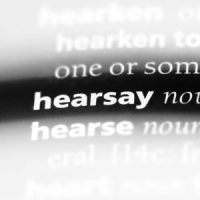Hearsay In Indiana Criminal Cases: A Detailed Overview

If you are facing criminal charges in Indiana, it is vital that you understand the rules of evidence. Among the many complex rules of evidence you need to know about is the hearsay rule. In Indiana, hearsay is generally inadmissible in a trial, but there are many exceptions to the hearsay rule. Below, we explain the meaning of hearsay, why hearsay is mainly regarded as unreliable, and some exceptions to the rule against hearsay.
What Is “Hearsay?”
“Hearsay” is a statement presented to the court by someone other than the person who made it to prove a fact asserted in the statement. In other words, hearsay is secondhand testimony. Generally, under the rules of evidence, hearsay is inadmissible in a trial. According to Rule 802, in Indiana, hearsay is inadmissible unless the law provides otherwise.
So, why is hearsay considered inadmissible? Hearsay is generally regarded as inadmissible because there is no opportunity to question the person who made the statement and determine whether or not they are credible. The objective of the hearsay rule is to prevent unreliable evidence from being used in court. A criminal conviction can adversely affect a defendant’s life, and courts don’t want people getting convicted based on unreliable evidence.
For instance, suppose John Doe is being tried for a crime, and Witness A tries to testify that Witness B told them they saw John Doe perpetrate the offense. In this case, because Witness B is not present in court, there isn’t a way for John Doe’s attorney to cross-examine Witness B to establish their credibility. Because of this, Witness A’s testimony regarding Witness B’s statement is not admissible at trial.
Exceptions to the General Rule
In some cases, hearsay is admissible in court. According to Rule 803, there are more than twenty exceptions to the hearsay rule, each of which allow otherwise inadmissible hearsay to be admitted as evidence. The following are some of the exceptions to the hearsay rule in Indiana;
- Excited utterance: After an exciting event, a person may make a statement on impulse. This is what is known as an “excited utterance.” It is believed that during or immediately after an exciting event, a person is highly unlikely to lie or make a false statement.
- A statement against interest: This is a statement that negatively affects the individual making it. The rationale behind this exception is that someone would not cook up unreliable information that makes things worse for themselves.
- Judgment of a previous conviction: As long as, among other things, the verdict was not entered after a nolo contendere plea, and the conviction was for a crime punishable by death or imprisonment for more than one year.
- Family records: For example, a statement of fact contained in a family record, such as a chart, Bible, burial marker, or engraving on a ring.
Contact an Indianapolis Criminal Defense Lawyer
The hearsay rule is quite complex. This article only scratches the surface of the hearsay rule and its exceptions. It would be best to contact a qualified criminal defense attorney for guidance if you’re facing criminal charges. Apart from helping you understand the hearsay rule, an attorney can help you understand the other rules of evidence and defend you against your charges.
If you’ve been charged with a crime and need legal guidance and representation, turn to the Indianapolis criminal defense lawyers at Rigney Law LLC today.
